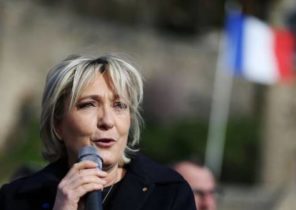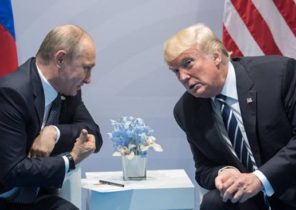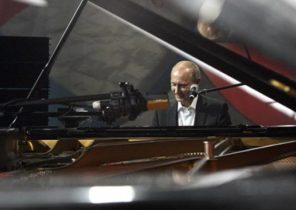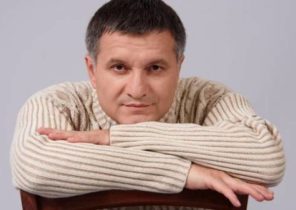
France and America, these two distant brotherly people similar to each other in many ways. One of the common traits — enthusiastic consciousness of their own greatness. “France cannot be France without greatness,” said the man who in the 20th century (twice) made France great again, Charles de Gaulle.
French journalist Eric Zemmour (Eric Zemmour) in his book, “French melancholy” proves that the self-consciousness of France developed in the middle ages. In that era, a number of lawyers from the South of France, where they continued to exist in Roman legal tradition, sought to restore the Roman Empire and was considered inexperienced dynastic line of Capetian in Paris as a conductor for their own purposes. Functioning as a kind of modern analytical center, they entered the entourage of the king, and gave him a technocratic tools to carry out the ambitious policy, France became the first European country where there were constant public service with merit-based selection methods and ideological and rhetorical justification for such policies.
Among the Western powers, France has almost always played a key role, but when it came to becoming a “Third Rome” — to achieve hegemony over the Western world as the dominant superpower akin to what is currently enjoyed in the United States — plans of France for centuries, all the time frustrated the British, then the Spanish. With the rise of the British Empire and now the United States those dreams never seem to come true. So, according to Samburu, not going anywhere, and so often discussed dissatisfaction that French culture is languishing for many decades. Like the former athlete who in his youth showed great promise, but blew his only attempt to enter the top League and now regrets that his prosperous family life of the middle class could be completely different, the French are painfully feel that could be a contender to win.
But perhaps the moment has come for this right now. The confluence of such circumstances, as Brakcet, the presidency of Donald trump and the weakening of Germany gives France a unique opportunity to become one of the leading countries in the world.
The opportunity presented by the trump is obvious. While people from the entourage of the American President convincingly not prove their willingness to re-assure the world that the United States will maintain its alliances, the power vacuum left by a disintegrating NATO will be for the politicians the perfect opportunity. The peoples of Eastern Europe need another country that could act as a guarantor of security. Due to historical circumstances, Germany, happiness, reluctantly embarks on a foreign adventure in many Eastern European countries don’t trust her, besides she doesn’t have nuclear weapons. France is not America, but the nuclear weapons it has, as one of the best armies in the world. In a broader sense, each niche that leave the United States, is a new opportunity not only for such obvious rivals as Russia and China, but for Western democracies with nuclear weapons, ocean-going fleet and a sufficient degree of arrogance. The middle East, where France has historical ties and where she has long been perceived as a respected and influential player (a privilege that she does not want to use it), also looks like a possibility.
As for Pexit, the French deliberately joined the European project to turn it into a conduit for our Imperial ambitions — if you want to call it a continuation of napoleonism in other ways. The idea was to do essentially what Angela Merkel was able to do in recent years for Germany because of the feebleness Francois Hollande. Today in Europe there is the realization that all work in Brussels, and Brussels in turn works in Berlin. Brakcet removes from the European balance of power, a key rival of France, and often change their priorities. Brakcet means that France is the only EU country that has nuclear weapons, ocean-going fleet, the ability to project power on a global level, as well as a permanent seat on the UN Security Council — all key strategic assets. Smaller European countries often complain that the decisions taken by the EU, in fact, the essence of what was agreed between France and Germany, with Pexit it will look even more plausible.
Today, Germany is the leading European power in part thanks to its impressive economic power, but also diplomatic skills of Angela Merkel. However, the Federal elections which will be held soon in Germany, can remove Merkel from the balance of forces. But more importantly: it seems that Germany reaches its climax. The demographic situation for the country is not favourable: the native population is aging and decreasing much faster than in France, which manage to maintain relatively high birth rate. Merkel decided to take a chance, eagerly accepted the migrants, but this rate is likely to be Germany’s side. Successful cultural and economic integration of such migrants in the conservative old country, a hell of a difficult task.
In other words, for France, all are better than ever. However, not enough of one ingredient: arrogance. Vladimir Putin is the most experienced statesman in the international arena. Russia plays an extremely important role in international Affairs despite its economy being less than the French. We used to say that his political influence in Russia was mainly attributable to high oil prices; now that oil prices are low, and the power position of Russia stronger than ever since the end of the cold war, we say that the growth generated by weakness. That’s right: because Putin knows he’s playing with weak cards, he had to be extraordinary simply, and the courage to come into play. And this, in turn, makes us ask a question: whether will get the next leader of France foresight and talent to finally open the French era?
In the past we invariably suffered failure. But at least we can try.






